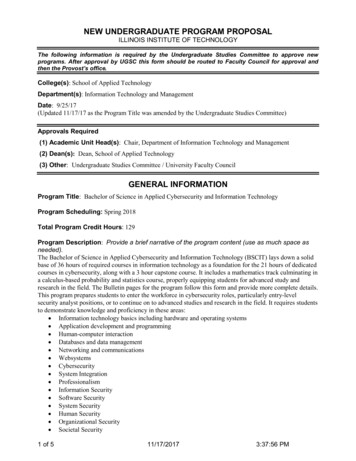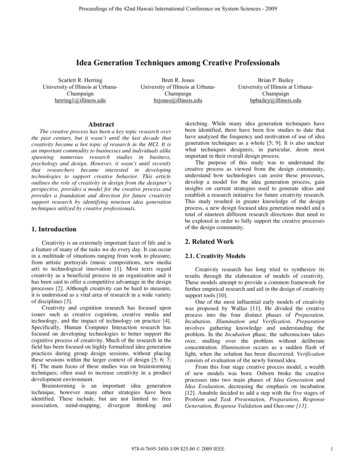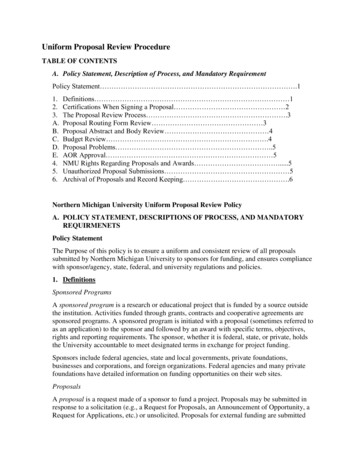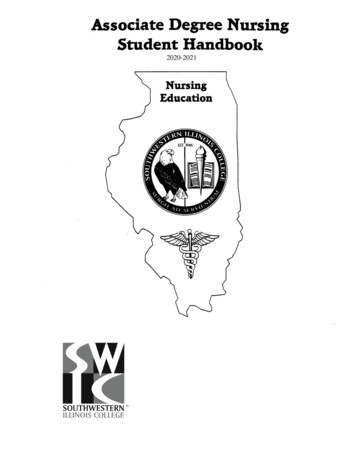
Transcription
NEW UNDERGRADUATE PROGRAM PROPOSALILLINOIS INSTITUTE OF TECHNOLOGYThe following information is required by the Undergraduate Studies Committee to approve newprograms. After approval by UGSC this form should be routed to Faculty Council for approval andthen the Provost’s office.College(s): School of Applied TechnologyDepartment(s): Information Technology and ManagementDate: 9/25/17(Updated 11/17/17 as the Program Title was amended by the Undergraduate Studies Committee)Approvals Required(1) Academic Unit Head(s): Chair, Department of Information Technology and Management(2) Dean(s): Dean, School of Applied Technology(3) Other: Undergraduate Studies Committee / University Faculty CouncilGENERAL INFORMATIONProgram Title: Bachelor of Science in Applied Cybersecurity and Information TechnologyProgram Scheduling: Spring 2018Total Program Credit Hours: 129Program Description: Provide a brief narrative of the program content (use as much space asneeded).The Bachelor of Science in Applied Cybersecurity and Information Technology (BSCIT) lays down a solidbase of 36 hours of required courses in information technology as a foundation for the 21 hours of dedicatedcourses in cybersecurity, along with a 3 hour capstone course. It includes a mathematics track culminating ina calculus-based probability and statistics course, properly equipping students for advanced study andresearch in the field. The Bulletin pages for the program follow this form and provide more complete details.This program prepares students to enter the workforce in cybersecurity roles, particularly entry-levelsecurity analyst positions, or to continue on to advanced studies and research in the field. It requires studentsto demonstrate knowledge and proficiency in these areas: Information technology basics including hardware and operating systems Application development and programming Human-computer interaction Databases and data management Networking and communications Websystems Cybersecurity System Integration Professionalism Information Security Software Security System Security Human Security Organizational Security Societal Security1 of 511/17/20173:37:56 PM
Program Purpose/Program Benefits: Provide details on the intent of the program and itsrelation to other programs. State the impact of the program for students and for IIT.Cybersecurity is one of the fastest growing fields in the world. “ISACA, a non-profit information securityadvocacy group, predicts there will be a global shortage of two million cyber security professionals by 2019.Every year in the U.S., 40,000 jobs for information security analysts go unfilled, and employers are strugglingto fill 200,000 other cyber-security related roles, according to cyber security data tool CyberSeek.” (Forbes,“The Fast-Growing Job With A Huge Skills Gap: Cyber Security” by Jeff Kauflin, March 16, 2017) Accordingto the U.S. Bureau of Labor Statistics, between 2012 and 2022, the rate of growth for information securityanalysts is expected to be 36.5 percent. With this huge gap in supply and demand, there is a clear need foreducated cybersecurity professionals in the job market, and an even bigger need for researchers in the field.ABET is expected to begin accrediting programs in cybersecurity possibly as early as 2018. Additionalworkforce demand details can be seen at the National Initiative for Cybersecurity Education (NICE) website ts/2017/01/30/nice workforce demand.pdfThis degree encompasses existing requirements for the Bachelor of Information Technology andManagement as a foundation and builds on this base to develop cybersecurity knowledge, skills, andabilities. When ABET finalizes the Program Criteria for Cybersecurity and Similarly Named Computingprograms, this program as drafted will meet requirements for accreditation in both Information Technologyand Cybersecurity.It will increase enrollment in the Department of Applied Mathematics because students will be required tocomplete a sequence of math courses leading to completion of a calculus-based course in probability andstatistics to properly equip them to pursue further research in the field.It will have the same admission requirements, mathematics requirements, and expectations as other IllinoisTech Bachelor of Science degrees in engineering and science.It will feed graduate programs in cybersecurity in our department. One of these programs is a researchdegree also being proposed, the Master of Science in Applied Cybersecurity and Digital Forensics. Theincreased visibility brought about by this research-focused degree path will attract more students and ideallywill eventually lead to designation of the university by the National Security Agency and the Department ofHomeland Security as a National Center of Academic Excellence in Cyber Defense Research.Significant Federal scholarship opportunities are open to students in this curriculum including theCyberCorps Scholarship for Service Scholarships, Department of Defense Information AssuranceScholarships, and the State Department Foreign Affairs Information Technology (IT) Fellowship Program.These programs not only cover two to three years of fully funded study, but also award stipends to studentsranging from 22,000 to 37,500 per year. In addition more limited scholarships are available nongovernment organizations such as the Cybersecurity Scholarships from the International Information SystemSecurity Certification Consortium’s Center for Cyber Safety and Education. These opportunities alreadyexist due to our designation by the National Security Agency and the Department of Homeland Security as aNational Center of Academic Excellence in Cyber Defense Education.There is a draft Model Curriculum for this degree jointly prepared by the Joint Task Force on CybersecurityEducation which includes ACM, IEEE-CS, and AIS SIGSEC athttps://docs.wixstatic.com/ugd/895bd2 331dd0a4e2cf41a1b17f394e3e62a955.pdf.In addition, the ABET accreditation Program Criteria for Cybersecurity and Similarly Named Computingprograms has just been placed in the public review and comment phase; the most current iteration of thesecriteria can be seen at ia.Classification of Instructional Programs (CIP) Code 1 1 . 1 0 0 3(Computer and Information Systems Security/Information Assurance.)2 of 511/17/20173:37:56 PM
PROGRAM VIABILITYCompetitive Programs: Indicate other similar programs locally and nationally detail theirsuccess.Serious competitors:Drexel University, Philadelphia, PA *Kennesaw State University, Kennesaw, GA *Pennsylvania State University, multiple locations, PA *Rochester Institute of Technology, Rochester, NY *Southern Methodist University, Dallas, TX *Stevens Institute of Technology, Hoboken, NJ *United States Air Force Academy, Colorado Springs, CO *United States Naval Academy, Annapolis, MD *University of Texas at San Antonio, San Antonio TX *Minor competitors:Bellevue University, Bellevue NE *(Illinois in blue)Capitol Technology University, Laurel, MD *Charleston Southern University, Charleston, SCCity University of Seattle, Seattle, WA *DePaul University, Chicago, IL *East Stroudsburg University, East Stroudsburg, PAFairleigh Dickinson University, Teaneck NJ *Illinois State University, Normal, IL (starting Fall 2017) *Immaculata University, Immaculata, PA *Lewis University, Romeoville, IL *National University, San Diego, CA *University of Central Missouri, Warrensburg, MOUniversity of Illinois Springfield, Springfield, IL *University of Nebraska Omaha, Omaha, NE ** National Center of Academic Excellence in Cyber Defense EducationOnline only degrees are not listed; there are a great number of those.Most degrees in this field are Master’s degrees.Market Analysis for Recruiting Students: Detail what work has been done with UG Admissionsto identify and recruit potential students.We are very aware of the market for graduates of the program, and have seen that awareness of theopportunities in this field have reached the secondary school level. Our ability to recruit students issignificantly enhanced by our designation by the National Security Agency and the Department ofHomeland Security as a National Center of Academic Excellence in Cyber Defense Education. Admissionswill target much of the same population historically attracted by other computing and engineering degrees atthe university.Market Analysis for Graduates: Detail what work has been done with the Career ServicesCenter to identify potential employment opportunities for graduates.By virtue of our cooperation and involvement with the National Security Agency, the National Initiative forCybersecurity Education, the Women in Cybersecurity Conference, and the Mayor Emmanuel’sCybersecurity Roundtable, we are very aware of the market for graduates of the program. We are activelyinvolved with and in contact with employers seeking students with these skills. In our weekly studentnewsletter we already regularly feature internship and employment opportunities in the field. Since wecurrently offer a professional master’s degree in cybersecurity, Career Services is already actively engagedin cultivating industry connections. Employability of our graduate is enhanced by our designation by theNational Security Agency and the Department of Homeland Security as a National Center of AcademicExcellence in Cyber Defense Education.3 of 511/17/20173:37:56 PM
ACADEMIC INFORMATIONEnrollment Estimates: Are there enrollment estimates for this program, and if so, what are theyand what are they based on? What is the minimum number of students necessary in the programto make the program viable (i.e.to offer classes unique to the program often enough)?Enrollment estimates are initially 20 to 25 first-year students per year. This is extrapolated from currentenrollment in the Bachelor of Information Technology and Management degree coupled with known interestand demand in industry. There is not a minimum number of students necessary for the new program tosucceed because only one completely new course is required and all new courses are coupled with existingor new graduate courses.Advising Strategy: Since quality advising is a key component of good retention, graduation andcareer placement, how will students be advised and mentored? Specifically for interdisciplinaryprograms, how will advising responsibilities be shared? What student professional organizationswill be formed? How will the department work with the Career Services Center to develop industryconnections?Students will be advised and mentored by existing advisers who are cybersecurity faculty members. No newadvisers will be required for this program.We have had initial formation of a student chapter of the High Technology Crime Investigation Association(HTCIA), and we will also investigate interest in forming a chapter of the National Cybersecurity StudentAssociation. We are the host of the NSF-funded national 2018 Women in Cybersecurity Conference and willcontinue our association with that conference beyond this event.Since we currently offer a professional master’s degree in cybersecurity, Career Services is already activelyengaged in cultivating industry connections. In addition, scholarships currently or expected to be offered tostudents in the curriculum come with significant connections to government employment including access tonational career fairs and travel funding for attendance.Course Requirements: Detail the courses needed for the program including courses currentlyoffered, new courses to be developed (including syllabi), and dependence on courses from otheracademic units with their commitments to provide these courses on a long-range basis. Includedescriptions of laboratories that will need to be developed along with equipment and facilitiesrequirements.All courses needed for the program are currently offered except for three new courses which are:ITMS 418 Coding SecurityITMS 438 Digital ForensicsITMS 483 Digital EvidenceITMS 418 and ITMS 438 already exist at the graduate level as ITMS 518 and ITMS 538, so they are not infact new courses but are adaptions of existing courses suitable for undergraduates, and will be taught incommon lecture sections with ITMS 518 and ITMS 543. ITMS 483 Digital Evidence is a new course. Asyllabus for each of these courses is attached.The program will add to student loading in MATH 151, 152, 230, 251, and 474, all of which are regularlyoffered in support of their own majors or other programs within the university. Draft accreditation criteriarequire completion of discrete mathematics and statistics.We already have an existing laboratory structure for our current cybersecurity degree, which has just beenaugmented by a 299,000 grant from the National Security Agency, so no new equipment or laboratoryfacilities will be required for this degree.4 of 511/17/20173:37:56 PM
Sample Curriculum/Program Requirements: Provide a sample semester by semestercurriculum and the program requirements, as they would appear in the IIT UndergraduatePrograms bulletin.Applicable pages providing a sample semester by semester curriculum and the program requirements, asthey would appear in the IIT Undergraduate Bulletin, are attached.Attached Program Outcomes and Assessment Process: Provide the program learning goalsand assessment plan (for more information contact the Assessment Office within AcademicAffairs). Also see g-assessment/Program Educational Objectives:The Bachelor of Science in Applied Cybersecurity and Information Technology degree produces graduateswho are able to:1. Problem solve, create, and effectively communicate innovative answers to provide technologysolutions for the problems of business, industry, government, non-profit organizations, andindividuals.2. Perform requirements analysis, design and administration of computer and network-based systemsconforming to policy and best practices, and monitor and support continuing development ofrelevant policy and best practices as appropriate.3. Design and implement an enterprise security program using both policy and technology toimplement technical, operational, and managerial controls, which will technically secure enterpriseinformation assets and resources to deter, detect, and prevent the success of attacks and intrusions.4. Investigate information security incidents and violation of law using computer resources in a mannersuch that all evidence is admissible in a court of law.5. Apply current technical and mathematical concepts and practices in the core informationtechnologies and recognize the need to engage in continuing professional development.Student Outcomes/Learning Goals:Students completing the Bachelor of Science in Applied Cybersecurity and Information Technology will beable to:(a) Analyze a problem and identify and define the computing requirements appropriate to its solution.(b) Design, implement, and evaluate a computer-based solution to meet a given set of computingrequirements.(c) Communicate effectively with a range of audiences about technical information.(d) Make informed judgments in computing practice based on legal and ethical principles.(e) Function effectively on teams to establish goals, plan tasks, meet deadlines, manage risk, andproduce deliverables.(f) Identify and analyze user needs and to take them into account in the selection, integration,evaluation, and administration of computer-based systems. [IT](g) Apply security principles and practices to the environment, hardware, software, and human aspectsof a system. [Cybersecurity](h) Analyze and evaluate systems with respect to maintaining operations in the presence of risks andthreats. [Cybersecurity](These learning goals are based on the newly-approved ABET Criteria 3 Student Outcomes forInformation Technology and the proposed ABET Criteria 3 Student Outcomes for Cybersecurity.)See the attached Assessment Plan for full details.5 of 511/17/20173:37:56 PM
Information Technology and ManagementINFORMATION TECHNOLOGY AND MANAGEMENT10 W. 33rd St.Perlstein Hall Room 223Chicago IL echnology-and-managementDaniel F. and Ada L. Rice Campus201 E. Loop Rd.Wheaton, IL 60189630.982.6000Dean and ChairC. Robert CarlsonAssociate Chair and Director of Undergraduate AdvisingRay TrygstadFaculty with Research InterestsFor information regarding faculty visit the Department of Information Technology and Management website.The objective of bachelors’ degrees offered by the Department of Information Technology and Management is to produce graduatesprepared for a career in the information technology field, while equipping them with the critical thinking skills necessary to cope withthe emergence of new technologies and with management principles needed to advance in their careers. While the Bachelor ofInformation Technology and Management degree was originally designed for students who have achieved an associate’s degree andwould like to complete a bachelor’s degree, students may also enter the program as first-year students. Bachelor of Science degreesgive students the mathematical grounding necessary to prepare them for further research-focused graduate studies.Government studies such as Free and Aspray: The Supply of Information Technology Workers in the United States, show that technologypositions will be the fastest growing segment in the United States for the next 30 years. Organizations of all kinds have become dependenton networked computing infrastructure as the key element to enabling modern business processes, and our graduates are preparedto select, manage, and maintain that infrastructure, ensuring that it meets organizational needs. Information technology professionalsassume responsibility for selecting hardware and software products appropriate for an organization, integrating those products withorganizational needs and infrastructure, and installing, customizing, and maintaining those applications for the organization’s computerusers. Planning and managing an organization’s technology infrastructure is a difficult and complex job that requires a solid foundation inapplied computing as well as management and people skills. Professionals in this discipline require special skills, such as understandinghow networked systems are composed and structured and what their strengths and weaknesses are, and being prepared to deal withimportant software systems concerns such as reliability, security, usability, and effectiveness and efficiency for their intended purpose.These topics are difficult and intellectually demanding.The Bachelor of Information Technology and Management degree produces graduates who are able to: Problem solve, create, and effectively communicate innovative answers to provide technology solutions for the problems of business,industry, government, non-profit organizations, and individuals. Perform requirements analysis, design and administration of computer and network-based systems conforming to policy and bestpractices, and monitor and support continuing development of relevant policy and best practices as appropriate. Apply current technical and mathematical concepts and practices in the core information technologies and recognize the need toengage in continuing professional development.To meet these goals, graduates must demonstrate knowledge and proficiency in these areas: Information technology basics including hardware and operating systems Application development and programming Human-computer interaction Databases and data management Networking and communications Websystems Cybersecurity Professionalism1
2Information Technology and ManagementBachelor of Information Technology and Management students are required to complete a minor. The minor may be in a field which willcomplement information technology such as business or professional and technical communication, or may be chosen from a field verydifferent such as history or sociology to provide a more widely rounded educational experience.The Bachelor of Science in Applied Cybersecurity and Information Technology degree produces graduates who are able to: Problem solve, create, and effectively communicate innovative answers to provide technology solutions for the problems ofbusiness, industry, government, non-profit organizations, and individuals. Perform requirements analysis, design and administration of computer and network-based systems conforming to policy and bestpractices, and monitor and support continuing development of relevant policy and best practices as appropriate. Design and implement an enterprise security program using both policy and technology to implement technical, operational, andmanagerial controls, which will technically secure enterprise information assets and resources to deter, detect, and prevent thesuccess of attacks and intrusions. Investigate information security incidents and violation of law using computer resources in a manner such that all evidence isadmissible in a court of law. Apply current technical and mathematical concepts and practices in the core information technologies and recognize the needto engage in continuing professional development.To meet these goals, in addition to the knowledge and proficiency expected of graduates in Information Technology and Management, Cybersecuritygraduates must complete 45 hours of coursework in computing and cybersecurity that must cover application of the crosscutting concepts ofconfidentiality, integrity, availability, risk, and adversarial thinking, as well as fundamental topics from the following areas: Information Security Software Security System Security Human Security Organizational Security Societal SecurityAdmission for transfer students is based on a review of college transcripts and documentation of work experience. Applicants must submitan application for admission as a degree-seeking student. Transfer applicants must hold an associate’s degree (A.A.) from an accreditedcollege or the equivalent (completion of at least 55 credit hours). Only courses in which the student has earned a grade of "C" or better maybe accepted for transfer. Supporting documentation to be included with the application includes official transcripts of all college-level work.IIT/College of DuPage and IIT/Joliet Junior College Dual Admissions ProgramsStudents who meet the requirements of the Dual Admissions Program (DAP) may enroll simultaneously at the College of DuPage (COD)or Joliet Junior College (JJC) and Illinois Institute of Technology. Students accepted into the DAP will have access to advising and otherservices from both institutions. Students who successfully complete the institutional course requirements of both institutions under theDAP will be awarded an associate’s degree from COD or JJC and a Bachelor of Information Technology and Management from IllinoisInstitute of Technology.Eligibility for the ProgramStudents applying to the DAP must be enrolled in one of the following programs:At COD: Associate of Applied Science in Computer Information Systems or Associate of Applied Science in Computer InternetworkingTechnologiesAt JJC: Associate of Applied Science in Computer Information Systems; Network Specialist, Programming, or Web Design andAdministration optionsStudents must have and maintain a cumulative GPA of at least 3.00 at COD or JJC to be eligible for admission to IIT. Students must makesatisfactory academic progress at COD, as defined by COD, or at JJC, as defined by JJC.Application ProcessApplicants must complete a Statement of Intent Form, which permits the exchange of academic admission and advising informationbetween IIT and COD or JJC. Applicants must also complete the application process at both COD or JJC and IIT in order to be admitted toboth institutions. The IIT application may be submitted only for a Bachelor in Information Technology and Management. Admission to otherIIT programs may have additional requirements that are outside the scope of the program.Academic Program RequirementsStudents must follow each institution’s policies regarding admission, course enrollment, transfer hours, probation, dismissal, andreinstatement. Transcripts must be sent to the IIT Office of Undergraduate Academic Affairs each semester for each student attending CODor JJC and enrolled in the DAP. IIT will provide COD and JJC with major and course updates, course prerequisites, and program requirementsfor the information technology and management bachelor’s degree completion program.
Graduation RequirementsInformation Technology and ManagementStudents enrolled in the DAP must follow the COD or JJC catalog to satisfy requirements for the associate’s degree and the requirementsset out in the IIT Undergraduate Bulletin in effect at the time of admission into the DAP for the bachelor’s degree.The Center for Cyber Security and Forensics EducationThe Center for Cyber Security and Forensics Education (C2SAFE) is a multi-disciplinary center within the School of Applied Technology. Theobjectives of the Center for Cyber Security and Forensics Education are to: Develop, promote, and support education and research in cybersecurity technologies and management, information assurance, anddigital forensics across all academic disciplines at Illinois Institute of Technology. Engage with business and industry, government, professional associations, and community colleges to enhance knowledge, awareness,and education in cybersecurity and digital forensics and improve practices in information assurance. Coordinate the designation of Illinois Institute of Technology as a National Center of Academic Excellence in Cyber Defense Education. Maintain resources for education and research in cybersecurity and digital forensics, publish student and faculty research in the field,and sponsor, organize, and conduct conferences and other events to promote and advance cyber security and forensics education. Support the university's academic departments in the delivery of the highest caliber of cyber security and digital forensics education.The center plans, organizes, and conducts the annual ForenSecure conference in the spring of each year, as well as additional activities andstudent competitions that advance the mission of the center.The center actively cooperates and coordinates activities with agencies of the federal government and with professional organizations andprograms such as the Information Systems Security Association (ISSA), the Information Systems Audit and Control Association (ISACA),the Association of Information Technology Professionals (AITP), the Association for Computing Machinery (ACM), the Institute of Electricaland Electronic Engineers (IEEE), UNIFORUM, CompTIA, Infragard, and others. The center makes every effort to engage in joint activities withthese organizations and to encourage them to engage with the center whenever possible.Illinois Institute of Technology has been designated as a National Center of Academic Excellence in Cyber Defense Education by theNational Security Agency and the U.S. Department of Homeland Security. This designation results from meeting stringent Center ofAcademic Excellence criteria and mapping of information technology and management curricula to a core set of cyber defense knowledgeunits. Students attending Center of Academic Excellence in Cyber Defense Education institutions are eligible to apply for scholarships andgrants through the Department of Defense Information Assurance Scholarship Program and the Federal Cyber Service Scholarship forService Program. This designation reflects Illinois Institute of Technology’s commitment to producing professionals with cyber defenseexpertise for the nation.Resources for education and research as well as published student and faculty research in the form of technical reports and white papersare available on the center’s website (appliedtech.iit.edu/c2safe).Degree Programs Bachelor of Information Technology and Management Bachelor of Information Technology and Management: Transfer Program Bachelor of Science in Applied Cybersecurity and Information TechnologyCo-Terminal OptionsThe Department of Information Technology and Management also offers the following co-terminal degrees, which enables a student tosimultaneously complete both an undergraduate and graduate degree in as few as five years: Bachelor of Information Technology and Management/Master of Cyber Forensics and Security Bachelor of Information Technology and Management/Master of Information Technology and Management Bachelor of Information Technology and Management/Master of Science in Cybersecurity and Digital Forensics Bachelor of Science in Cybersecurity and Information Technology /Master of Science in Cybersecurity and Digital ForensicsThese co-terminal degrees allow students to gain greater knowledge in specialized areas while, in most cases, completing a smaller numberof credit hours with increased scheduling flexibility. For more information, please visit the Department of Information Technology andManagement website nagement).3
4Information Technology and ManagementCourse DescriptionsITM 100Introduction to Information Technology as a ProfessionIntroduces students to the profession of information technology,beginning with concepts of systems, systems theory andmodeling, information systems, and system integration.Examines the steps necessary to analyze a business problemand identify and define the computing and informationrequirements appropriate to its solution, with a focus on how todesign, implement, and evaluate a technology-based system tomeet desired needs. Students learn to analyze the local andglobal impact of computing on individuals, organizations, andsociety. Lead
Kennesaw State University, Kennesaw, GA * Pennsylvania State University, multiple locations, PA * . Minor competitors: Bellevue University, Bellevue NE * (Illinois in blue) Capitol Technology University, Laurel, MD * . offered in support of their own majors or other programs within the university. Draft accreditation criteria











